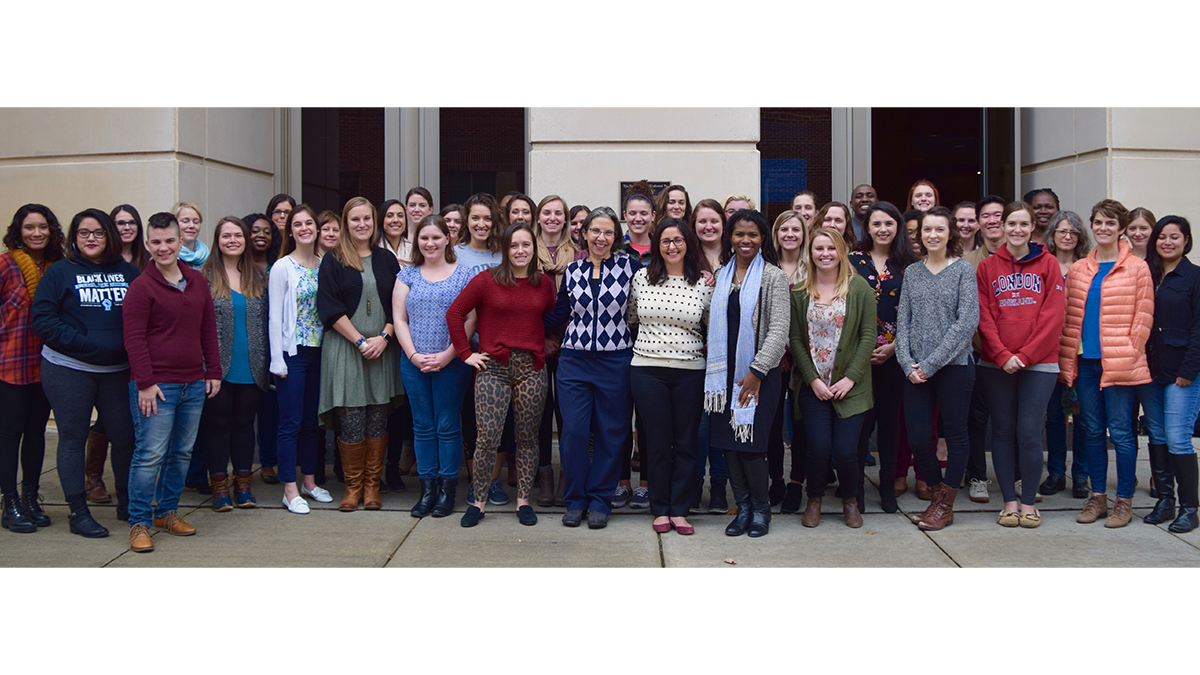Treating patients holistically
UNC-PrimeCare is working to address the needs of people across the life span, reaching out to serve rural and underserved communities and populations in North Carolina.

An innovative training program at UNC School of Social Work has become a national model for integrated behavioral health care.
Launched in 2014 with a grant from the Health Resources and Services Administration, UNC-PrimeCare was created to train Master of Social Work students to provide integrated behavioral health care for children and young adults.
“Traditionally, our healthcare system has separated behavioral health and physical health care — providers, locations and appointments have all been fragmented,” said Lisa de Saxe Zerden, senior associate dean at Carolina’s School of Social Work and principal investigator for UNC-PrimeCare research. “In reality, there is a deep interconnection, and an integrated approach to health care allows an individual to receive care in more of a one-stop approach.”
Funded by a second HRSA grant in 2017, UNC-PrimeCare expanded to address the needs of people across the life span, reaching out to serve rural and underserved communities and populations in North Carolina.
“UNC-PrimeCare puts social workers into health and behavioral health care settings to help treat individuals holistically — we understand the social factors that impact health outcomes,” Zerden said. “This aligns well with where social work jobs are forecast to be. This area of social work is expected to grow 20 percent over the next 10 years.”
With its second grant, UNC-PrimeCare created an interprofessional partnership between the School of Social Work and the UNC School of Nursing to train future psychiatric mental health nurse practitioners in addition to future direct practice social workers.
UNC-PrimeCare works with participating health clinics and health centers in North Carolina, where trainees can become part of a team of providers that address patient, family and population health needs more comprehensively.
On these interprofessional teams, the students help address various social factors that impact a patient’s health, from helping resolve food insecurity in the home to finding transportation options to ensure a patient can travel to follow-up appointments.
The teams also work with health care providers to find appropriate treatment options for patients with mental health conditions, substance use disorders or other challenges that may not be addressed by general medical practice.
“Social workers in the health setting, and now our students, are so flexible in what they do — they can tailor their interventions based on the setting and the patients’ needs,” Zerden said, adding that this is one reason that integrated behavioral health programs such as UNC-PrimeCare have become a popular approach to care delivery.
Ayat Soufan is one of more than 100 School of Social Work graduates who has participated in UNC-PrimeCare since its inception five years ago. As a trainee, she provided care management services in a clinic, went on home visits with a health care provider and worked with first-year medical residents on case studies for a workshop about suicide, depression and anxiety.
“We can all work together to provide the best care for our patients,” said Soufan, who now works with Carolina’s Infectious Diseases Clinic to provide integrated health care for persons living with HIV/AIDS. “Through integrated health care sites, social workers can provide behavioral health counseling and other supportive services within a clinic setting, which can help reduce the stigma associated with accessing these services.”
Specialized field experiences focusing on integrated health care, such as those in which Soufan participated, are one of several program components that set UNC-PrimeCare apart. Other components include a required course, “Integrated Health Care with Underserved Populations,” and a series of intensive seminars on topics ranging from psychopharmacology to cultural beliefs about health care.
Each student also completes a capstone project before graduation. The capstone projects typically explore the needs of many different population groups, such as children with autism, the Latinx LGBTQ community, persons with intellectual disabilities, persons in rural areas seeking mental health treatment, or senior adults in the prison system.
UNC-PrimeCare’s educational impact extends beyond the University campus and its students. The program also offers behavioral health clinicians across the state free continuing education programs.
Because integrated behavioral health care is an emerging field, both in social work and in nursing, UNC-PrimeCare is uniquely positioned to contribute toward research about the roles of these professions in the health care workforce.
“Because of UNC-PrimeCare, the School of Social Work is seen as a leader in integrated behavioral health care across campus, within the state and nationally,” Zerden said.
For more information about UNC-PrimeCare, visit: uncprimecare.sites.unc.edu




